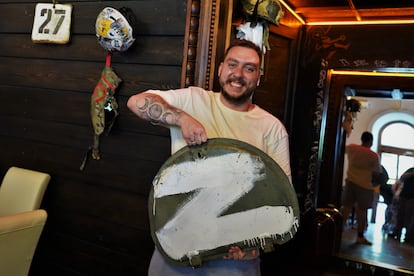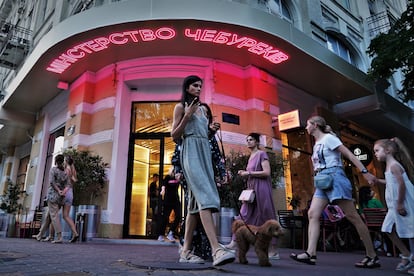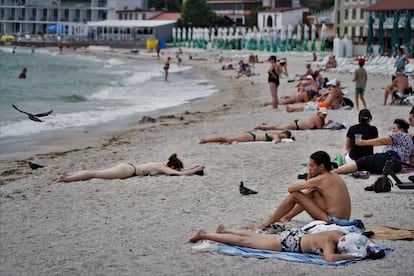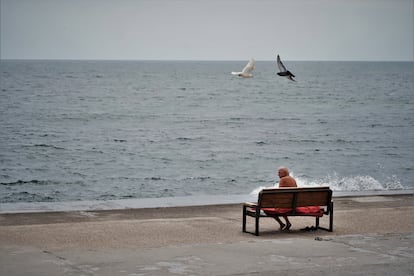War stifles tourism in Odesa
A decade ago, 75% of visitors to the Black Sea commercial and tourist capital were Russian. Now the city is the main target of Moscow’s bombs

“I don’t know if the guys launching the missiles are paying attention to the UNESCO map,” jokes Ivan Liptuga, head of Odesa Tourism and Culture. The historic center of this city was added to the World Heritage List last February in view of the risk of destruction by the Russian invasion. The main Ukrainian city on the shores of the Black Sea, the target of constant Russian shelling these days, is barely surviving as one of the country’s economic engines driven by tourism, trade, and transportation. The occupation of Crimea by Kremlin troops in 2014 was already a blow and then, when Odesans could just about see the light at the end of the tunnel of the pandemic, Vladimir Putin ordered a great invasion of Ukraine on February 24, 2022. “This recognition by UNESCO is very important because it helps us to protect ourselves from the external enemy and also to preserve our heritage internally,” Liptuga comments.
The bombings of the last three days have targeted some of the seven ports in the region, which make Odesa the main hub for Ukraine’s imports and exports. For the past year, its coastline has been the point of departure for Ukrainian grain heading to the wider world, thanks to the so-called Black Sea initiative. The agreement provided a safe corridor despite the war, however, Russia refused to sign an extension to the deal last Monday. Amid Kyiv’s expressed desire to continue to move grain ships out, Moscow has responded by launching missiles for three days in a row on infrastructure and grain storage at the port, although homes and stores have also been hit. Moreover, Russia pointed out that these attacks represent a “retaliation” to those carried out by Ukraine against Kremlin interests in the occupied Crimean Peninsula.
The war has left behind figures that today are staggering in the trident of what were once the three most visited cities in Ukraine: Lviv, Kyiv, and Odesa. Until 2013, the year before Crimea was occupied, almost half of those arriving from outside were Russians. They were followed by Belarusians, Moldovans, Poles, and Romanians. The number of Russians soared to 75% in the case of Odesa, says Liptuga, 43, who has been in the industry for more than 20 years. These tourists spent four or five times more than a local traveler, which made it possible, despite the seasonality linked to spring and summer, to last the whole year.

On the eve of the great invasion, a Russian family hired 36-year-old guide Artem Vasiuta for their visit to Odesa for a week in August. That trip never happened and Vasiuta, with hardly any tours booked, decided a few months ago to also become a cab driver to support his family. His wife, also a guide, is pregnant and now unemployed. They couldn’t complain about how life was going for them, he recounts during a walk through the city that includes everything from the latest bombed-out sites to Lanzheron beach. There is a certain hustle and bustle there and the ban on bathing imposed after the arrival of debris from the flood caused by the blowing up of the Nova Kakhovka dam, more than 200 kilometers (124 miles) away, has had no real effect. “In 2021, we were bringing in about $20,000 [about €18,000], a good amount here in Ukraine, and we were hoping to get up to about $25,000 in 2022,″ he says. Now he can’t help but remember the two fellow guides killed by the war, one in Mikolaiv and the other in Bakhmut.
With a business opportunity on the horizon, Tania Aver, 25, began training as a guide before the Russian invasion. She arrived in Odesa at the age of 16, fleeing the occupation of her hometown, Donetsk, when the war was raging in eastern Ukraine. Conflict, uprooting, and a dramatic family history with the death of her brother and father at the hands of the Russians meant she needed help in 2017. “I didn’t know what PTSD was until I realized I was suffering from it. Mental health is a big problem in this country,” says the young woman, who never stops thinking about possible projects to help her get ahead, even if she is swimming against the tide. She already has her brand-new credential as a guide, but the war has prevented her from working due to a lack of clients. Nevertheless, she says that summer 2023 in Odesa is “a paradise” compared to the previous year.

“It would have been worse if the Russians had come here,” says Violeta Diduk optimistically. The 42-year-old is another tour guide who is booking three to four times fewer tours than before. Most of them, she points out, are refugees from other regions or locals who entertain themselves by getting to know their own city. Only a few are foreign journalists and volunteers.
The region’s head of tourism recalls that the last of the 150 cruise ships per season to dock in the port of Odesa, a city of one million inhabitants in 2021, did so on May 2, 2014, the year when Russia illegally seized Crimea. Today, the region’s more than 350 kilometers (217 miles) of coastline, many with white sandy beaches, are a visitor wasteland compared to a decade ago. “Ethically and morally,” in the midst of war, he recognizes that it is not worth trying to seek alternatives to the Russians as they did with the Chinese, Saudis, Europeans or the Ukrainians themselves when their main customers vanished because of the conflict over the last decade. In addition, “everything had to be closed on February 24, 2022,” laments Liptuga, alluding to the first day of the great Russian invasion. His office is a few hundred meters from the city’s emblematic Opera and Ballet Theater, which has kept up its programming for the native public.
Vasiuta had just started his new tour of Jewish Odesa on February 22, 2022, and just one day earlier, on the 21st, he had celebrated International Tour Guide Day with dozens of colleagues. “During that event I had a bad feeling. I thought it would be our last meeting in peace,” he says, still overwhelmed that he was not mistaken.

Odesa represents the best example of a multicultural and multiethnic city, explains Ivan Liptuga, the great-great-grandson of a Greek, Yannis Likiardopulos, who came to the city and married a Cossack. In the 19th century, Jews made up half of the population. Today they barely exceed 1%, explains Niusa Verkhovska, 36, acting director of the Jewish Museum, while incumbent is in the army. At the height of the summer season, only two or three people a day visit the site, compared to about fifty before the war.
“My children are the seventh generation of Jews in Odesa and, for me, this museum is like another child,” Verkhovska comments. So after escaping as a family to Germany last year, they decided to return four months ago. “Odesa is a country within the country. I didn’t feel much of a connection to Ukraine, but now because of the war I feel like a Ukrainian Jew,” she says as she caresses the display cases that hold some of her ancestors’ artifacts. “I want a gun and to fight,” she says she was asked by her 12-year-old daughter Karen, who “became very depressed in Germany and drew pictures of the dead in Bucha after watching the news. It was very hard.”

In the midst of war and with a curfew from midnight to 5 a.m., the locals are forced to close at 10 p.m., so that Odesa’s famous nightlife remains mortally wounded. The center, in the midst of that delightful architecture that UNESCO wishes to protect, is a hive of people of all ages as Friday evening falls, but, like Cinderella, they leave for home at the time when the city once began to bustle.
Nikita Hirenko is a brave 25-year-old who, in July 2022, with Odesa rather more lethargic than it is now, decided to open the Hoppy Hog pub. “It was now or never,” he notes, referring to a plan he had already had in mind since before the pandemic arrived. “It [the pub] works very well and is a good meeting place, although we can’t forget that we’re in a country at war,” he explains while showing off the venue’s war decor. Part of the pub’s profits go to help the troops. He has several helmets, the remains of a Russian armored vehicle with the pro-war Z motif painted in white, and even remains of the fuselage of an enemy fighter plane. “It’s from a Sukhoi they shot down at the front and brought to me as a birthday present on September 13 when it was almost still warm,” he says as he savors one of the many beers they brew themselves.
Sign up for our weekly newsletter to get more English-language news coverage from EL PAÍS USA Edition
Tu suscripción se está usando en otro dispositivo
¿Quieres añadir otro usuario a tu suscripción?
Si continúas leyendo en este dispositivo, no se podrá leer en el otro.
FlechaTu suscripción se está usando en otro dispositivo y solo puedes acceder a EL PAÍS desde un dispositivo a la vez.
Si quieres compartir tu cuenta, cambia tu suscripción a la modalidad Premium, así podrás añadir otro usuario. Cada uno accederá con su propia cuenta de email, lo que os permitirá personalizar vuestra experiencia en EL PAÍS.
¿Tienes una suscripción de empresa? Accede aquí para contratar más cuentas.
En el caso de no saber quién está usando tu cuenta, te recomendamos cambiar tu contraseña aquí.
Si decides continuar compartiendo tu cuenta, este mensaje se mostrará en tu dispositivo y en el de la otra persona que está usando tu cuenta de forma indefinida, afectando a tu experiencia de lectura. Puedes consultar aquí los términos y condiciones de la suscripción digital.









































